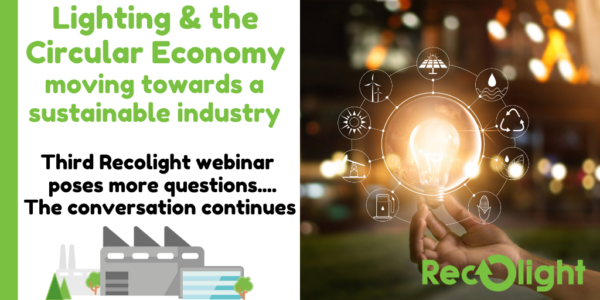Third Recolight webinar in the Circular Economy series poses more questions
 The third webinar in the Recolight Lighting & the Circular Economy series was held on 15 September. It continued the conversation by discussing the next steps required for the lighting industry to move towards a Circular Economy.
The third webinar in the Recolight Lighting & the Circular Economy series was held on 15 September. It continued the conversation by discussing the next steps required for the lighting industry to move towards a Circular Economy.
Introducing the session, Ray Molony said, “Over the past decade, the lighting industry has rolled out LEDs and we have all patted ourselves on the back that we have done our bit for sustainability, but in some ways we’ve gone backwards, the most obvious of which is the separability of our products. It was easier to separate and recycle a fluorescent luminaire than an LED downlight. In general, the lighting industry has been a rule taker and it appears we are waiting for the European eco-design regulations to drive the changes we need to see in the market”
Ray Added: “In terms of products, one major issue is that there isn’t yet an agreed industry-wide metric or standard about what actually is a circular economy luminaire. Hopefully, a planned Cenelec standard will address this deficiency.
Most importantly, the industry needs to have a meaningful dialogue about the extra costs associated with circular economy measures, and we need to address these honestly.”
Owain Griffiths, Head of Circular Economy Strategy at Oakdene Hollins outlined the size, barriers, and opportunities to deploying a Circular Economy model. He explained that the Circular Economy seeks to save raw materials, carbon, and energy.
He added “We need good quality recycled raw materials to compete favourably with virgin raw materials. To enable this, we need a review of waste shipment regulations, advanced recycling technologies, and new technologies to reveal critical raw material values. “
William Skeates, Senior Compliance and Sustainability Manager at Sky described how the company planned to achieve its goal of being net carbon zero by 2030. Key to this was a move from sales to a service model which means all products are owned by Sky, giving them control over the lifecycle of product.
He explained that key processes to achieve carbon net zero include:
- Reduced product size means reduced costs for packaging and logistics
- Refurbishment programme for returned set top boxes
- Durable and upgradeable products
- Products have a second life at end of first use.
Helen Loomes, Business Development Director at Trilux Lighting shared the results of Repro-light, an EU funded research project to assess the sustainability and circular economy of luminaires.
The project undertook a full lifecycle assessment of the luminaires, including production, use, and disposal. This analysis showed that the use phase of a luminaire accounts for some 99% of the total energy used. She presented data to show that the new requirement for replaceable light sources within eco-design legislation may not always produce the best environmental outcome
Michael Grubb, Creative Director of Michael Grubb Studios, talked through the success of his studio’s Re:lit project. A project that since 2014 has taken lighting equipment that would be sent for recycling and instead put them into service in new projects.
The studio uses superseded product lines, old samples, ex-demonstration equipment, and products that contain outdated LED lamps. They ensure that the final lighting solution is at least 50% more efficient than the existing scheme it replaces.
The webinar concluded with a panel discussion addressing the end user; their expectations, requirements, and how the lighting industry should position themselves with a Circular Economy model. Ray Molony was joined by Peter Fordham, Electrical Engineering Design Manager, Sainsbury’s, and Marcus Steffan of MS Lighting Design.
Peter Fordham, head of electrical engineering at Sainsbury’s, said “ The lighting industry must make a compelling case for the total cost of ownership if it is to persuade customers to install lighting made to circular economy principles”, he explained that while the supermarket giant is keen to play its part in decarbonising the supply chain, the lighting industry must make a strong business case for products with a low environmental impact. If there is a lower total cost of ownership then [the investment] is justifiable and we can start to see these products get installed”
The webinar posed more topics to discuss! Replaceable LED modules as mandated by the Eco-design regulations, a takeback service, a network for reuse of luminaires. and a sustainable business model for Circular Economy luminaires.
Recolight will announce a series of follow up roundtable discussions in the next 2-4 weeks. They will again be available online, and free to join.
Link to replay and slide pack for Third Recolight Webinar
Lighting & the Circular Economy: Moving towards a sustainable industry

